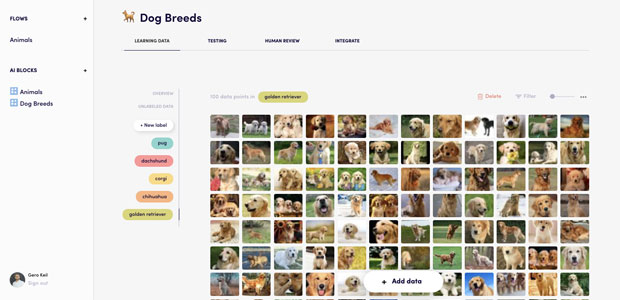
Berlin-based startup to bring no-code AI workflow automation to anyone
Levity, the no-code artificial intelligence tool for workflow automation, has announced the launch of its flagship product that enables knowledge workers to automate tedious manual work processes in an easy-to-use platform.
Work often consists of repetitive tasks, such as reviewing and categorising documents, images, or text within marketing, customer service, operations, HR, finance, and business development teams. Conventional automation software cannot automate these kinds of simple human tasks, as they require cognitive abilities, so they are usually done manually.
Levity allows users to build AI-powered workflows to recognise and classify documents, images or text by simply dropping examples of their data into the system and training custom AI solutions. These can then be integrated with hundreds of other tools like Gmail, Dropbox, and Slack. At the same time, Levity takes care of the AI and automation aspects, which would alternatively have to be handled by a data science team and software integration experts.
“Building AI tools traditionally required many repetitive steps: Collect, label, and store unstructured data, train a model in the cloud, test and improve, put it in production, and try to manage prediction quality on the fly,” said Thilo Hüllmann, Levity’s Co-founder and CTO. “We designed Levity to be able to handle all of this in the background, so users don’t need dedicated AI engineers and can focus on creating seamless workflows that integrate with all other business software they use without ever having to write a single line of code.
For example, customer service teams field thousands of support tickets per day and need to determine the topic, the urgency, positive or negative tone, etc. With Levity, customer service teams can build their own AI solutions tailored to the specifics of their business to quickly identify whether the issue is around payment, delivery, quality control or another issue and automatically process and tag any future tickets. This frees up knowledge workers’ time to focus on meaningful and creative work.
One of Levity’s early customers, Hear.com, sells hearing aids through thousands of partners globally. Its staff spends a considerable amount of time classifying inbound documents from these partners and entering the details into Salesforce for processing. Its operations team started working with Levity to automate the process of identifying 45+ different inbound document types from customer tests, orders, and insurances. Hear.com uploaded samples of each document type into Levity’s drag-and-drop interface, from which the AI could learn what each of these document types look like to classify them automatically in Salesforce. By automating the process through Levity’s AI platform, each person in the team saves up to 8 hours per week.
Moritz Wahrlich, Business Analyst at Hear.com said: “Our team was collectively spending 20% of their time on the menial task of sifting through hundreds of incoming documents a day to classify them for our files and for further processing. We wanted a system that could automate this task so that our team could spend their time truly adding value to our partners, customers, and the company’s growth. We were impressed with the flexibility Levity provided us to build a bespoke solution without us having to code at all.”
“We are thrilled to be able to bring these capabilities to non-technical people so that AI can truly improve their working lives,” said Gero Keil, Co-founder and CEO of Levity. “Levity was born from our own pain points. We knew the technology was out there to automate those repetitive tasks that take up so much time but couldn’t find a single product that caters to the average person who can’t code but whose life would benefit from AI. We look forward to bringing these capabilities into the mainstream.”
As the platform is horizontal, Levity is not restricted to any particular industry or department. It can be used for most business processes involving human decisions based on images, documents, or raw text and is just limited by the imagination and available data of the user. Some of the use cases that users have built using Levity include:
- Customer service: categorise and tag inbound messages and support tickets; analyse text responses for surveys; segment your customer feedback based on sentiment and uncover underlying patterns, so that your customer support team can be twice as efficient
- Surveys: evaluate and categorise feedback or marketing survey responses automatically, so that you don’t have to evaluate them manually in a spreadsheet
- Insurance: examine claims and automate documentation even before it reaches the claims processing team, so that they can focus on the more complex parts of their jobs
- Content moderation: scan thousands of images and text in the blink of an eye for content that violates platform policies, so your platform is protected in real time, and content moderation teams can focus on creativity
- Supply chain and logistics: automatically classify shipping documents and route those to the right persons, to drive higher real time automation and efficiency
- Real estate: automatically analyse thousands of images such as room type, amenities, furniture style, and image quality so that you’ll never show bad pictures again in automated ads
Gil Dibner, General Partner and Founder at Angular Ventures, said: “Levity is driving a massive shift that will affect all knowledge workers. By allowing knowledge workers to easily train AI engines, build AI-powered automations, and integrate them into their everyday workflows, Levity is radically democratising the benefits of AI.”
Levity is available now in closed beta for anyone looking to automate document-, text- or image-based tasks and workflows.


